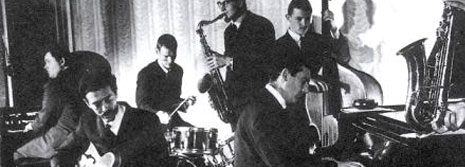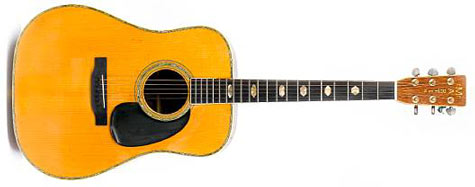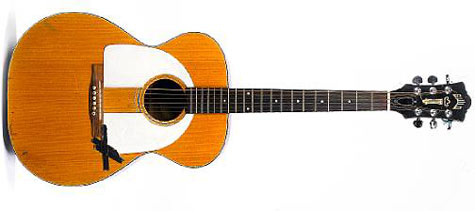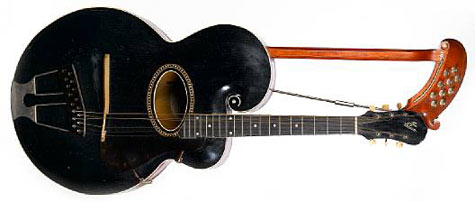
The great bluesman and broadcaster Alexis Korner died in 1984 – at the age of 54 – having helped shape the course of postwar popular music. From the late 50s to the early 80s he mentored and inspired the young musicians who would later form the Rolling Stones, Small Faces, Cream, Manfred Mann, Free, Led Zeppelin and many other bands – including my own. As a musical ambassador Alexis also helped bring just recognition for many giants of Afro American music. Legendary artists such as Big Bill Broonzy, Otis Spann, Sonny Terry and Brownie McGhee regularly stayed with Alexis and his wife Bobbie as house guests, while Muddy Waters was godfather to their daughter Sappho. Alexis enjoyed five Top 40 hits of his own with CCS in the early seventies, before making his name as one of the nation’s foremost music broadcasters, with a breadth and range of musical taste matched only by the late John Peel.
Alexis was a connoisseur not only of music and musicianship but also of musical instruments. I remember him showing me how to sound out the front and back of an acoustic guitar, listening for a subtle difference in pitch. On a well-built instrument, he explained, a tap on the soundboard should always sound roughly a semitone higher than the back. He warned against the shiny ultrahard varnishes on many newer guitars which – he said – prevented the soundboard from resonating freely and maturing with age. Instead, he advised me to find myself an older model with traditional varnish crazed into hairline cracks around the bridge and soundboard – the hallmark of an instrument that had been properly “played-in”.
The very first guitar Alexis owned was home-made, built during wartime by his friend Syd Hopkins from Finchden Manor. Over the years I remember him with Telecasters, Strats, a Les Paul, a baby Gibson and even an old Swedish Levin, all of which came and went. Some he sold, some he gave away: he was always more interested in playing guitars than collecting them. There were, however, five treasured instruments he could never bear to part with.

When Alexis had started out playing in 1950s Britain, American guitars were few and far between. A Martin Dreadnought – the Rolls Royce of US acoustics – was an impossibly rare and expensive instrument he could only dream of owning. In the 1960s Martins became more widely available, but there were production problems on many of the newer models. The company finally hit their stride again in 1969 with a completely redesigned Dreadnought that would set a new standard for the seventies. In 1970 Alexis was persuaded to try out one of these brand new D-41s at Ivor Mairants’ Musicentre and bought it on the spot.
This magnificent instrument would probably have been his pride and joy, but for a chance meeting with the renowned Dutch guitarist Eelco Gelling from Cuby & The Blizzards. Gelling had been offered (and turned down) the chance to replace Eric Clapton in John Mayall’s Bluesbreakers, but Alexis was an artist he held in reverential awe. In 1968 Eelco’s band invited their hero to Düsseldorf for a joint live concert recording – with consequences that would pass into Korner family folklore.
Eelco’s prize possession was a well-worn Guild F-30 with a beautiful action and gloriously rich sound – despite the neat hole bored in its side that had once mounted a pickup. From the moment Alexis picked it up, he found himself hopelessly in love with another man’s guitar. By a lucky chance, Eelco meanwhile had a covetous eye on Korner’s trademark black leather jacket. A deal was done, an exchange was made. Alexis came home with the instrument that would become his lifelong companion, cheerfully replacing the famous coat with a natty snakeskin number from Ozzie Clarke. The Dreadnought meanwhile languished almost unplayed in its case as an expensive second best.

Although the list of his musical collaborators over the years reads like a Who’s Who of UK rock aristocracy, the finest band I ever saw Alexis perform with was Snape. In 1971 he and Peter Thorup had been opening for King Crimson in the US when the headliners suddenly and acrimoniously split up mid-tour. Robert Fripp flew home leaving the three other members – together with Alexis and Peter – in New Orleans. The five men formed a new band, named it Snape, and carried on playing their way across the States. Like you do.
It was in America that Alexis acquired one of the oddest – and rarest – instruments ever manufactured. Orville Gibson invented his harp guitars at the end of the 19th Century and discontinued them in the mid-1920s after only a few hundred had been made. Many had already been lost or destroyed by the early seventies, and to find a 1913 model in mint condition at an affordable price was a connoisseur’s dream. Alexis seized the opportunity and brought the monster home to his bemused family. Alas the complexity of even getting the thing in tune – let alone mastering its 16 strings – soon defeated him, and it remained in its case alongside the neglected Dreadnought.
The one Martin guitar that did capture Alexis’s imagination was the Tiple, a small ten-stringed ukulele-like instrument with a stretched neck and overgrown headstock. He’d first been drawn to its sound on 1930s country records by artists such as the Carter Family, and asked the London guitar dealer Ivor Mairants to find him one. It took ages, but when Ivor finally delivered, Alexis worked hard on mastering the instrument. With the likes of Page, Clapton, Hendrix, Beck and Kossoff all jostling for attention in 1960s London there was no sense in competing as just another guitar player. But by evolving his own unique style on the Tiple, Alexis could hold his own on any stage and in any company – and indeed put it to good effect when recording the Snape album at Island studios. As the UK’s foremost Tiple player he was in a class of one.

Alexis was, however, a reluctant frontman – always preferring to act as a catalyst rather than a figurehead, even within his own bands. He tended to pack them with outstanding musicians – and even singers – so that he himself could step back from the limelight and let them shine. Yet whoever happened to be showing off out front, it was Alexis who called the tunes, set the tempos, and – crucially – laid down the grooves with his masterly rhythm guitar chops.
For this he needed an authoritative electric sound that could make its presence felt through even the rowdiest blues jam. While everyone else was bending their Fenders and distorting their Les Pauls, Alexis opted for the clean crunchy tones of a vintage semi-acoustic made famous by Scotty Moore – the Gibson ES-295 – with the company’s classic tweed Explorer amp, renowned for its combination of power and portability.
 The ES-295 has always been regarded as rockabilly classic – yet it was inexplicably discontinued in 1958. By the time Alexis acquired this 1954 instrument as his main stage guitar it was already priceless – and he took considerably greater care of it than he did of the amp. His cigar-burnt Explorer bears witness to countless gigs and jam sessions when Alexis, carried away by the music, would put down a lit cheroot mid-song and promptly forget all about it. The combination of style, sound, playability and unique history make Alexis’s golden Gibson and its battlescarred amp the crown jewels of this collection.
The ES-295 has always been regarded as rockabilly classic – yet it was inexplicably discontinued in 1958. By the time Alexis acquired this 1954 instrument as his main stage guitar it was already priceless – and he took considerably greater care of it than he did of the amp. His cigar-burnt Explorer bears witness to countless gigs and jam sessions when Alexis, carried away by the music, would put down a lit cheroot mid-song and promptly forget all about it. The combination of style, sound, playability and unique history make Alexis’s golden Gibson and its battlescarred amp the crown jewels of this collection.
By way of an odd postscript, his Roland Jazz Chorus amp was a late acquisition. Given the purist pedigree of his guitars, his choice of a brand new Japanese solid-state amp rather than some thoroughbred Fender might seem surprising. Yet for all his appreciation and understanding of the past, Alexis’s greatest strength lay in his insatiable appetite for the new. His keen-eared curiosity led to him not only discovering several generations of gifted musicians, but also owning one of the most wide-ranging record collections I’ve ever seen in my life. In later years the unique sound of Roland JC series would be made famous by Andy Summers of The Police and Jeff Buckley. Typically though, it was the pioneering Alexis Korner who discovered it first.
The above amps and instruments are lots 218 – 225 in a collection of entertainment memorabilia being auctioned at Bonhams in Knightsbridge on December 15th 2010 from 12pm. Click here to view detailed descriptions or register to bid in the saleroom on the Bonhams website.














Fantastic review – I didn’t know he had so much kit, and it’s still in the family!
I love that D-41. I remember Martin guitars for their warm sound but never had the opportunity to get my mitts on a Dreadnought. It will be interesting to see how much that goes for – hope it gets the price it deserves. RIP Alexis.
I think it’s a real disgrace that these items have now forever left the Korner family’s control; surely what they raised can’t be a life-changing sum for beneficiaries? Maybe I should take a lead and sell my grandad’s WWII medals…….
Never seen a harp guitar before, how fascinating and looking at that Bonhams
link it sold for £2100, infact lots of them
in my opinion sold for much less than I would of thought.
Chris, I could not agree more! When I was told the family were selling the guitars I was very sad. I even tried to buy the Guild but the ‘door was locked’ to me! A crying shame!
Chris and Toni you could not be more wrong.
“The family” as you call them have been hit by a series of catastrophic tragedies. First Alexis himself, then his eldest son Nico, then his daughter Sappho and finally – perhaps most cruelly of all – the remaining son Damien have all died one after the other, and all of them many years before ther time. Of the original Korner family only Alexis’s widow Bobbie is left.
How dare either of you have the temerity to criticise her for placing these items at auction, when neither you nor I know anything of her present circumstances?
I do know that Alexis was a bluesman and jazz broadcaster – neither of them overpaid professions. He toured every year of his life to earn a living and there were no big-selling albums to provide a fat pension for his dependants.
Bobbie held onto these guitars and amps for decades after his death. Do you suppose she would have sold her husband’s most treasured possessions without the most pressing need to do so – or even then, while any of his children were left alive to inherit them?
The “real disgrace” and the “crying shame” is that in 2010 the wonderful Bobbie Korner – who offered a welcoming home from home to many of today’s superstars back when they were penniless – should be in a situation where she needed to sell these instruments at all.
Tom, I did not mean mean to criticise Bobbie for one moment. She is a dear friend of mine as were all the family. The crying shame here is that these lovely old instruments are almost certainly now in the hands of collectors who will hang them on their walls and show them off! Guitars are made to play and gig!
I certainly have no axe to grind with Bobbie!
I sincerely hope you understand and I’m sorry I didn’t make myself clearer!
All the best,
Toni.
Thank you for this glimpse of musical history—I never missed a radio programme of Alexis and recall him from when I was tiny and watching “‘Five O’clock Club”‘ or maybe “‘Tuesday Rendezvous”‘(circa 1964?) when he had his big band on.
When Alexis had his rhythm & blues programme during the late 1970s I listened in for his tributes to Lowell George and other blues artists. Alexis got me listening to Cajun, blues and everything else the way Mike Raven had done a few years before.
He had an incredible knowledge and I very few are his equals.
When I grew up in London we’d see Alexis in many places and during gigs but took him for granted.
So sad to hear of the passing of his dear children…I remember Sappho well.
How did his children die? Hopefully it wasn’t drugs?
Thank you Tom Robinson for this blog!
Would anyone have recordings of any of Alexis Korner radio broadcasts from mid 1960’s, especially one with the ARTWOODS as guests. Thank you, Tony.
antfreer@yahoo.ca
Alexis told me that the Gibson 295 was a gift from Steve Marriott.
Being a friend of Damian’s wife I remember being in his studio and him showing me series of very good worn acoustic guitars, he even let me play them. It was about 20 years ago and Culture clubs Jon Moss popped by, I’m sorry for Damian’s wife and son , who had the gravelly voice of his grandfather even as a early teenager.